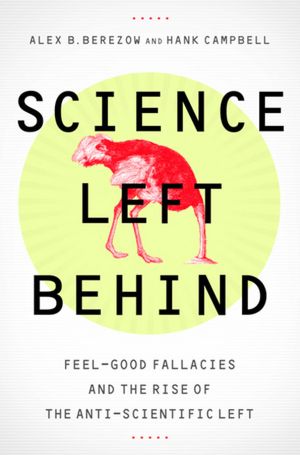 Reviewed: Science Left Behind: Feel-Good Fallacies and the Rise of the Anti-Scientific Left by Alex Berezow and Hank Campbell (PublicAffairs, 320 pp., $26.99). Sixty percent of Republicans do not believe in evolution. Only 11 percent of Tea Party supporters think man-made climate change is real.
Reviewed: Science Left Behind: Feel-Good Fallacies and the Rise of the Anti-Scientific Left by Alex Berezow and Hank Campbell (PublicAffairs, 320 pp., $26.99). Sixty percent of Republicans do not believe in evolution. Only 11 percent of Tea Party supporters think man-made climate change is real.
But according to Alex Berezow and Hank Campbell, authors of Science Left Behind: Feel-Good Fallacies and the Rise of the Anti-Scientific Left, progressives are the real science deniers.
Progressive opposition to genetically modified foods, their distrust of nuclear energy, and their concern over the health effects of fracking are all fodder for the authors’ argument that the left is anti-science.
The right wing certainly doesn’t have a monopoly on the inappropriate use of science for ideological purposes. Science has been used and abused by all groups. Fringe anti-vaccine advocacy predicated on fraudulent scientific research, for example, has had terrible public health consequences in many states, including Berezow’s own Washington State.
But the authors’ specific claim that progressives have a pervasive, anti-science mythos is dubious.
Take, for example, Berezow and Campbell’s depiction of progressive resistance to genetically modified foods. “There is not even a single documented case of GM food causing a stomachache, let alone any lingering health problems,” they write.
They point to GE salmon, the first genetically engineered animal to be considered by the FDA for human consumption: “The FDA has confirmed that [GE salmon] has passed every test—but it is still not feeding anyone.” The reason? Pesky progressive activists and their allies in Congress.
What Berezow and Campbell fail to mention is that, although GE salmon was green-lighted through the initial stages of review, the FDA based its decision largely on science conducted by AquaBounty, the company that breeds the salmon.
So the pesky progressive activists called for an environmental impact statement (EIS) that would require the FDA to enlist independent scientists to analyze the potential ecological consequences of an escaped, fertile GE salmon into the wild salmon population, as well as the nutritional standards of fish being marketed as “the future of salmon aquaculture.” (Preliminary tests showed that the GE salmon has fewer omega-3 fatty acids than farmed or wild salmon.) In other words, an EIS would mitigate some of the dangers of relying on company science.
Those dangers were apparent even to some scientists who participated in the FDA review process. In 2010, when I called Dr. Gary Thorgaard, a professor at Washington State University who’d sat on the FDA’s review panel earlier that year, he was even blunter, saying that AquaBounty’s research would likely not have been accepted for publication in a peer-reviewed scientific journal.
Seen in full context, then, this “progressive” advocacy for an environmental impact statement is not anti-science, it’s the opposite: a call for robust, unbiased research that stands up under objective scrutiny. Who would expect anything less from the research that forms the basis for regulation that protects the American public from unnecessary harm?
Berezow and Campbell’s other arguments about the anti-science left—from hot-button issues like drilling in the Arctic National Wildlife Refuge to the Keystone XL pipeline to Bisphenol A in baby bottles—are similarly riddled with holes.
The authors’ selective use of facts won’t convince readers of anything that they don’t already believe. Which is too bad: In these dark times of underreporting, we need more journalists to hold the line on misrepresentations of science—coming from the left, right, and everywhere in between.
Alison Fairbrother is the director of the Public Trust Project, a nonpartisan, nonprofit organization that investigates and reports on the manipulation of scientific research by corporations and government. She lives in Washington, D.C.



0 Comments